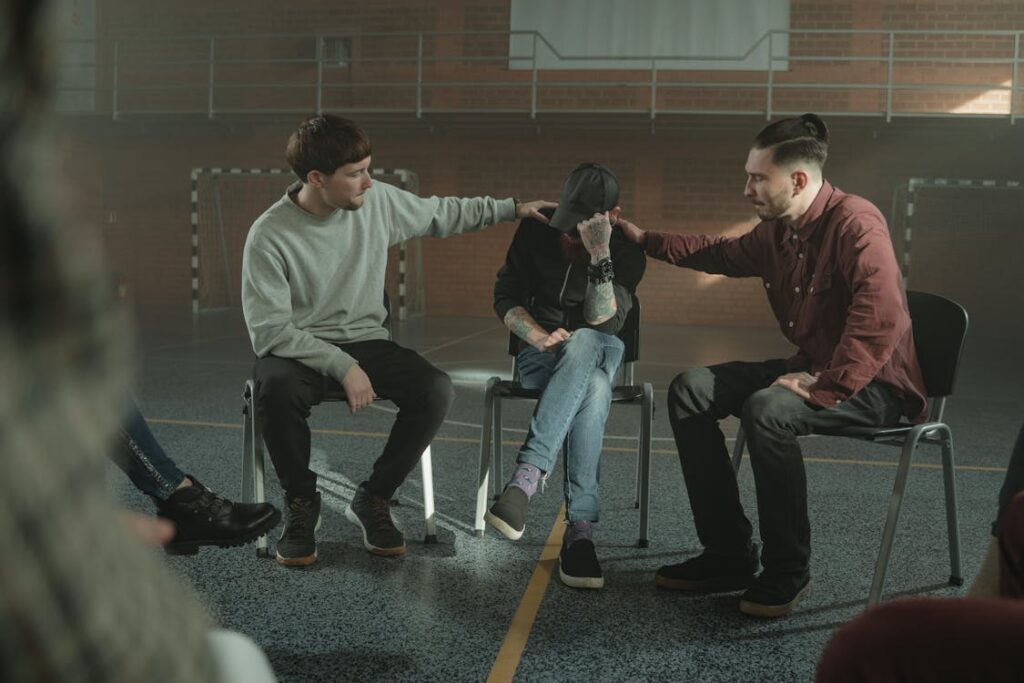Losing a limb changes more than just how you move. It changes how you see the world — and how you see yourself. The road after amputation is full of physical challenges, yes, but it’s the emotional journey that often feels the hardest. You’re not just healing from surgery. You’re healing from shock, grief, fear, and the feeling that no one around you truly understands what you’re going through.
This is where peer support becomes life-changing.
Talking to someone who’s walked in your shoes, someone who knows what it feels like to wake up with a missing limb and still find a way forward, can make a world of difference. Their presence brings comfort. Their words bring clarity. And their experience brings something that doctors and therapists often can’t offer — a real, lived understanding.
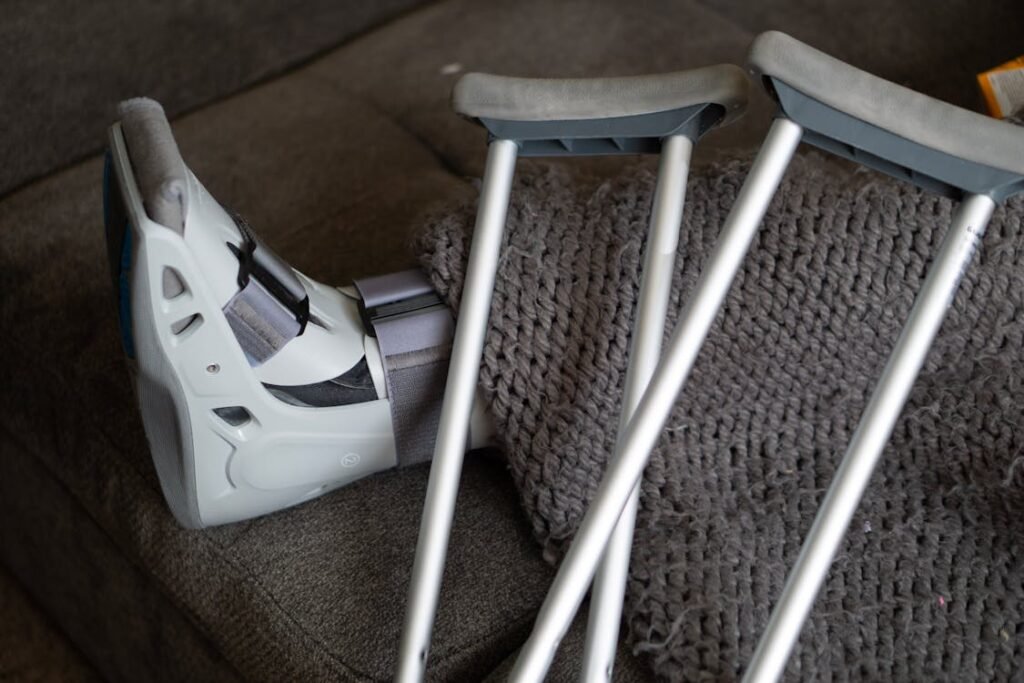
Understanding Amputation Trauma: Beyond the Physical Wound
The Invisible Weight of Limb Loss
When someone loses a limb, the first focus is usually the body. There’s surgery, pain, bandages, and physical therapy.
But underneath all of that is another kind of pain — one that people don’t always talk about. It’s the mental and emotional weight of amputation.
Suddenly, everything is different. Walking becomes difficult. Simple tasks require effort. Mirrors reflect a body that feels unfamiliar.
Even smiling can feel like a struggle when inside, you’re wrestling with fear, anger, or sadness. Many people try to stay strong on the outside, but inside, they feel lost.
The truth is, losing a limb isn’t just about movement. It’s about identity. It’s about loss — of ability, of independence, of who you thought you were.
These emotions are completely normal. But they’re also heavy. And when they’re carried alone, they can slow down healing.
That’s why emotional recovery needs just as much attention as physical recovery. And that’s where peer support begins to shine.
Why Talking to Someone Who’s “Been There” Matters
There’s something powerful about hearing, “I’ve been through it too.” It doesn’t come from a textbook. It doesn’t need fancy words. It’s real, simple, and honest.
For someone newly facing life after amputation, those words can break through the loneliness and fear.
Doctors and therapists can help a great deal, but they haven’t lived it. A peer, someone who has gone through amputation and come out the other side, brings a different kind of truth.
They understand what it’s like to wake up from surgery and feel panic. They’ve felt the frustration of learning how to move again. They know the sting of staring at a prosthetic for the first time and thinking, Is this really my life now?
This kind of understanding isn’t taught — it’s earned through experience. And when a peer offers their story, it opens a door for the new amputee to say, “If they can do it, maybe I can too.”
This isn’t just emotional comfort. It’s a shift in mindset. When a person believes that healing is possible — not because a doctor told them, but because someone just like them lived it — they begin to heal faster, mentally and emotionally.
Building Trust and Reducing Fear
Right after an amputation, everything feels uncertain. The future seems blurry. Will I walk again? Will I be able to work? Will people look at me differently? These questions spin around in your head, day and night.
A peer can bring clarity to this chaos. They can answer those questions — not with theory, but with real-life truth. They can explain what helped them, what didn’t, what surprised them, and what gave them strength.
And because they’re not wearing a white coat or speaking from a podium, their words feel relatable and safe.
This sense of safety builds trust. A new amputee may be hesitant to talk about their fears with a doctor or family member. But with a peer, they often feel more open.
They can share their darkest thoughts, their silliest worries, and their biggest hopes — without fear of being judged or misunderstood.
And this trust doesn’t just help emotionally. It opens the door to asking questions about prosthetics, phantom pain, intimacy, or even social life — topics that are often left untouched in medical conversations but are very real in everyday life.
Normalizing the Healing Journey
Every amputee’s journey is different, but many face the same emotional phases: denial, anger, sadness, and finally, acceptance. But when you’re in the middle of that storm, you don’t always realize that what you’re feeling is normal.
A peer can normalize that experience. They can say, “I felt that way too.” Or, “You’re not weak — I cried for weeks.” These simple truths help the new amputee understand that healing isn’t a straight line.
There are good days and bad ones. There are days of strength and days of tears. And that’s okay.
This validation is healing in itself. It tells the person that they’re not broken. They’re human. And they’re not alone.
Peers can also share how they moved through those tough phases. Maybe it was journaling. Maybe it was joining a support group.
Maybe it was simply sitting outside for five minutes a day to feel normal again. These tips don’t come from textbooks — they come from life. And that makes them powerful.
Lifting the Mental Load Through Shared Stories
There’s a silent weight that comes with trauma — the feeling that no one really understands. Even the most supportive friends and family can’t always connect with what you’re going through. This can make recovery feel lonely.
But when a peer shares their story — honestly and without filters — something shifts. That story becomes a bridge. It creates a space where you no longer feel like the only one.
You begin to see your struggle reflected in someone else. You start to believe that your fears aren’t foolish, and your pain isn’t too much. And maybe, for the first time in weeks, you start to hope.
Peer support doesn’t erase trauma. But it softens the edges. It fills in the emotional gaps that medicine alone can’t reach. And sometimes, just knowing someone else made it through is enough to help you keep going one more day.
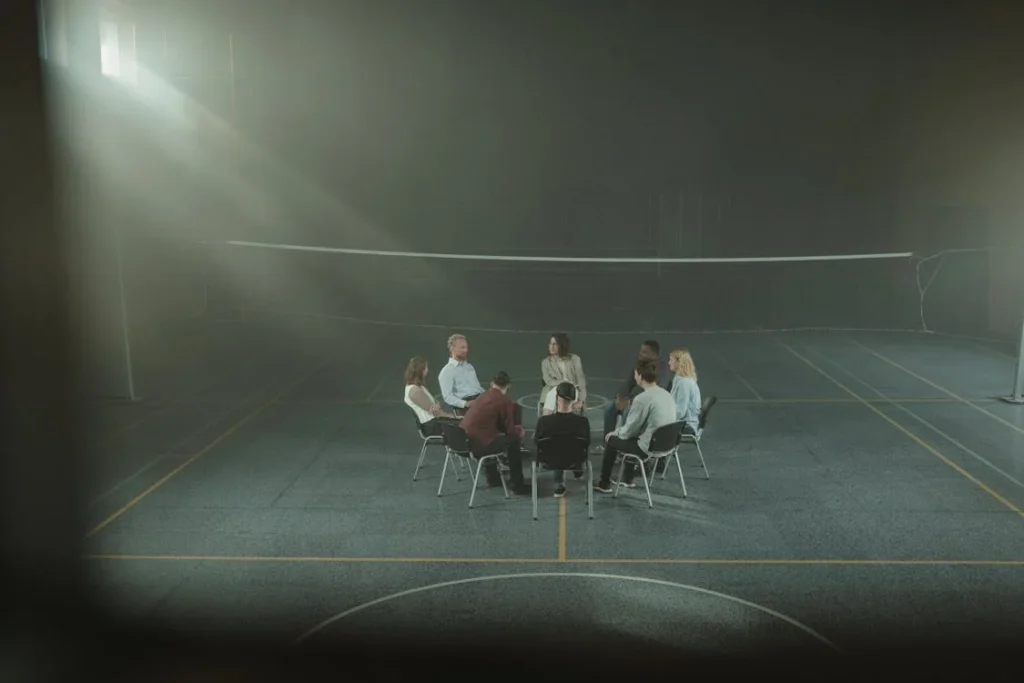
Peer Support in Action: How It Actually Works in Real Life
Formal Peer Support Programs and Their Impact
In many hospitals and rehabilitation centers, peer support is no longer seen as just an optional extra — it’s becoming a structured part of care.
These programs are thoughtfully designed. New amputees are introduced to trained peer mentors who have already gone through recovery and have lived with limb loss for months or years.
These mentors are not volunteers who show up to say a few kind words and leave. They are carefully selected, trained to listen, and prepared to offer support in a way that is safe, empowering, and meaningful.
They know how to talk about the hard parts of recovery without overwhelming someone. They know how to share their story in a way that brings hope, not comparison.
Most importantly, they know how to listen without trying to fix anything — because sometimes, the best support is just being heard.
At Robobionics, we’ve worked closely with rehab centers and support groups to create peer-led networks.
When a new patient is fitted for a prosthesis, we often try to connect them with someone who has been there before — someone using a similar type of prosthetic, living in a similar environment, or even facing similar challenges, like returning to work or raising children.
This kind of connection doesn’t just educate. It empowers. A new amputee sees someone living life, walking, laughing, and thriving — and suddenly, the future doesn’t seem so dark.
Casual, Everyday Peer Connections That Make a Difference
Not every peer connection happens through a program. In fact, some of the most meaningful support comes from simple, everyday conversations.
It might happen in a waiting room at the prosthetics clinic, during a therapy session, or even on social media.
Someone notices the look on your face. They remember that look — because they had it too. They start talking. You start listening. And before you know it, you’re sharing fears and victories with someone who just “gets it.”
These unplanned connections are often some of the most authentic. There’s no pressure. No agenda. Just two people having an honest conversation about life after amputation.
In India, where formal resources can sometimes be limited in rural areas, these kinds of peer interactions can be especially valuable.
We’ve seen community-led groups pop up in small towns where amputees meet monthly, talk openly, and share tips — everything from how to wear a prosthetic sock properly, to how to deal with stares in public.
Even phone calls or WhatsApp messages between two people on similar journeys can make a huge impact. A quick “How are you doing today?” from someone who truly understands can lift someone’s mood more than any motivational video ever could.
Peer Support for Family Members
Amputation affects more than just the person who underwent surgery. It deeply touches their family, too.
Spouses, parents, children — they all go through their own emotional process. They worry. They struggle. They try to be strong, but sometimes they don’t know how to help.
Peer support can be just as important for them.
Some programs pair caregivers with other caregivers who’ve walked a similar path. These conversations help reduce fear, lower stress, and build confidence in the care they’re providing.
It also gives family members a space to share their own emotions, frustrations, or confusion without feeling guilty.
At Robobionics, we’ve seen how powerful this can be. When a caregiver talks to someone who once felt lost and overwhelmed, but now feels calm and confident, it gives them hope. It also reminds them that they’re not alone, and that it’s okay to ask for help, too.
Reducing Isolation Through Community
One of the hardest parts of post-amputation recovery is the feeling of being cut off — from the world, from social circles, even from your own self.
Some people withdraw. They avoid going out. They stop doing things they love because they feel different, or ashamed, or like no one would understand.
Peer support cuts through that isolation.
Whether it’s one-on-one or in a group setting, it creates a safe, welcoming space. People can share openly without judgment.
They can talk about real things — body image, intimacy, job fears, depression — without the fear of being seen as weak or negative.
This feeling of belonging is more powerful than most realize. It reduces anxiety. It improves mood. It builds resilience.
When someone feels seen, heard, and accepted, their whole outlook changes. They become more willing to try again, to keep going, to believe in life beyond amputation.
Some of our most successful prosthetic users didn’t get there because of technology alone. They got there because someone believed in them when they were at their lowest. And often, that “someone” was a peer who simply said, “I know how you feel. And you can get through this.”
The Right Words at the Right Time
Sometimes, recovery doesn’t need big advice. It needs the right words at the right time. Words that don’t feel like instructions or therapy sessions. Words like, “I remember feeling that way.” Or, “It gets better, I promise.”
These words carry weight. They’re simple, but they come from the heart. And they often stick longer than clinical instructions or motivational quotes.
When a peer says something meaningful in the middle of a tough day, it can turn the tide. It can help someone show up to the next therapy session. Or take a step they were scared to take. Or simply smile again after a hard night.
That’s the power of peer support. It’s not flashy. It’s not complex. But it’s real, and it works.
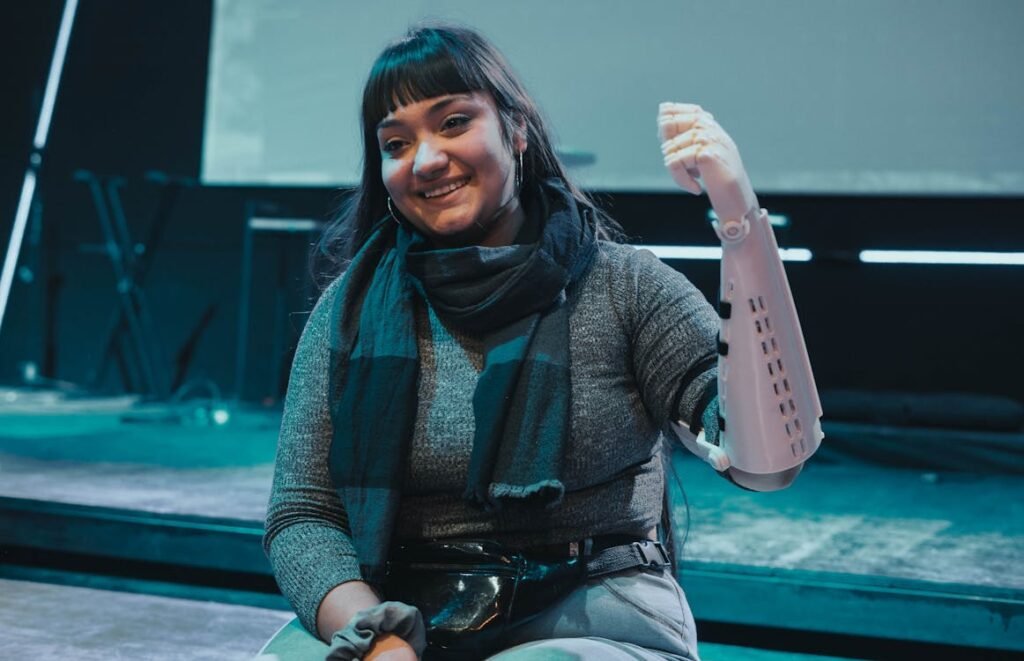
Beyond the Hospital: The Ongoing Role of Peer Support in Long-Term Recovery
Life After the First Year: The Journey Isn’t Over
The first year after an amputation is filled with visible milestones. The wound heals. The prosthesis is fitted. Physical therapy begins. And for many, the external signs of progress become easier to see.
But after that first year, something else begins — a more subtle, often invisible phase of recovery. This is when peer support continues to matter just as much, if not more.
People assume that once someone starts walking or managing their day-to-day tasks, they’ve fully adjusted. But that’s not always true. Emotional ups and downs can appear long after physical recovery seems complete.
Some amputees report that months or even years later, they feel a sudden wave of sadness or frustration. They begin questioning things again.
They may face new challenges — a career shift, a relationship change, or even new discomfort with their prosthetic limb.
It’s during this stage that peer support takes on a new shape. It becomes less about guiding someone through the basics and more about walking beside them through real life.
It’s about having someone to talk to who understands the changes that come with aging, changing health, or the ups and downs of prosthetic use.
At Robobionics, we’ve seen amputees find immense value in long-term peer connections. They don’t need to talk every week.
Sometimes, just knowing someone is there — a quick message away — brings comfort and reassurance that no matter how far along you are, you’re never alone.
Living With a Prosthetic: Learning Through Others
Life with a prosthetic is not static. As your body changes, your prosthesis might need adjustments. Sometimes, your limb shrinks.
Other times, it swells. The socket might start to rub, or you might develop skin irritation after years of use.
These physical issues are common, but they can be deeply frustrating. They interrupt routines. They trigger emotional setbacks.
But when you have a peer who has dealt with the same problems, you gain access to real-world solutions.
Maybe they tried a different liner. Maybe they found a better way to manage sweat in hot weather. Maybe they found a new technique for putting the prosthesis on faster in the morning.
These are the kinds of insights that often never make it into medical guides, but they come up naturally in peer conversations.
The benefit of this shared wisdom isn’t just practical — it’s emotional. When you face a new issue and someone says, “Yes, that happened to me too,” it takes away the fear. It replaces stress with possibility. You go from feeling stuck to feeling supported.
Evolving Identity and Acceptance
Even years after an amputation, questions of identity can continue to surface. How do you see yourself now? How do others see you? Are you defined by your limb loss, or are you something much more?
For many, these questions don’t disappear — they evolve. And the people who can help answer them aren’t always professionals or family members. Often, they’re other amputees who have also struggled to make peace with their new identity.
These deeper conversations are where peer support becomes transformational. They move beyond surface-level tips and tricks. They touch on meaning, purpose, and how to move forward with confidence.
At community meetups we’ve hosted, we’ve seen amputees in their 20s speaking to those in their 60s — and vice versa — sharing ideas about dignity, intimacy, careers, and self-image.
These exchanges often lead to breakthroughs. A young man learns from a retired athlete how to stop seeing his prosthesis as a weakness. A mother learns from another mother how to explain her limb loss to her children without fear.
It’s these cross-generational, peer-to-peer moments that bring lasting healing.
Reintegration Into Society With Peer Encouragement
Another crucial aspect of long-term recovery is reintegration — returning to work, social events, hobbies, and community life.
These can be some of the most intimidating steps. There’s fear of how others will react. Fear of being treated differently. Fear of being judged or stared at.
Peers can ease this process more than anyone else.
Someone who has re-entered the workforce after amputation can offer practical advice: what kind of support to ask for, how to handle workplace questions, and how to navigate tasks that feel different now.
Someone who has gone to social events with a prosthesis can share how they dealt with curious eyes or uncomfortable questions.
They can share their own mistakes, and more importantly, how they handled them with grace.
This kind of guidance gives new amputees a road map. It takes away the pressure of trying to figure everything out alone. It offers not just courage, but also strategy.
And when challenges arise, as they always do, peer support offers perspective. It reminds people that one bad experience doesn’t define their journey.
It helps them reset, regroup, and move forward with a bit more confidence than before.
Becoming a Peer Mentor Yourself
Perhaps one of the most empowering moments in an amputee’s recovery journey is when they become the support they once needed.
We often see this shift when someone who has received peer support starts to offer it. It may start casually — a comment in a support group, a message to a new amputee, a conversation in a rehab center.
And soon, they realize they’re helping others in the same way someone once helped them.
Becoming a peer mentor doesn’t require perfection. It doesn’t mean your journey is complete. In fact, the best mentors are the ones still growing — still learning — but willing to share what they’ve discovered so far.
This sense of giving back adds a new layer of healing. It brings purpose to pain. It allows people to look at their trauma not just as something that happened to them, but as something that shaped them into someone who can now light the way for others.
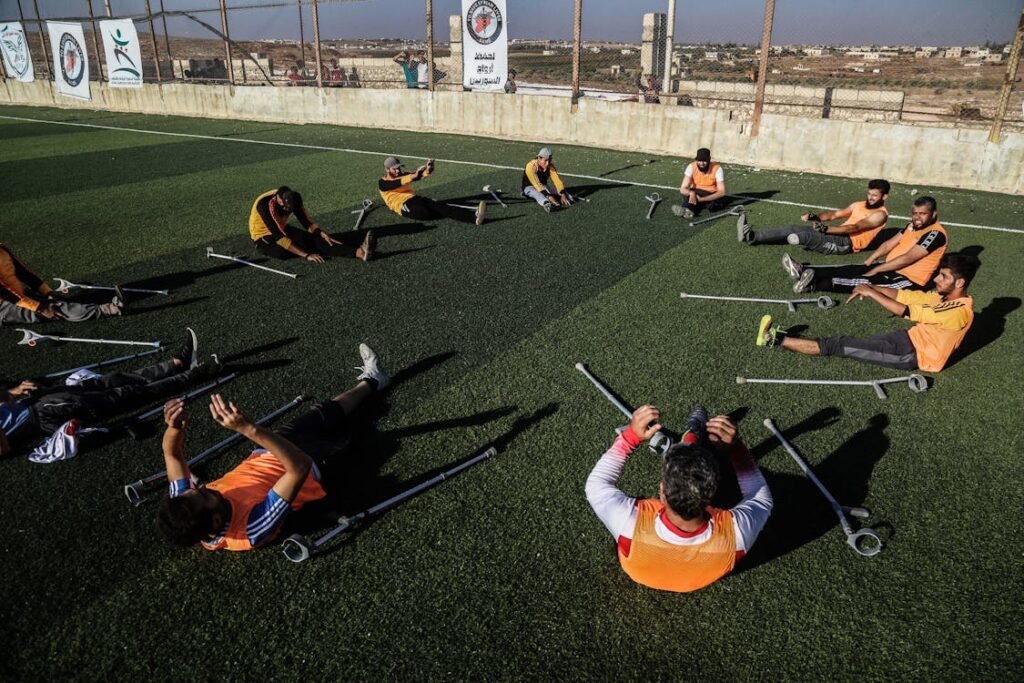
Making Peer Support Accessible: Bridging Gaps in Awareness and Access
Why Not Everyone Knows Peer Support Exists
Despite the many proven benefits, peer support is still something many amputees never hear about.
This is especially true in rural areas or smaller towns across India, where access to advanced rehabilitation services and emotional care is limited.
For many patients, once the surgery is over and the stitches are removed, they are sent home — with little more than physical therapy instructions, if even that.
What happens next is often a quiet struggle. Without guidance or emotional support, these individuals are left to figure out recovery on their own.
They may assume that the emotional pain they feel is something to hide or just deal with silently. And because they don’t see others like them in their community, they may feel isolated or “different.”
This is where awareness makes all the difference.
At Robobionics, we’ve made it a priority to not only provide high-quality prosthetics but also create awareness about the value of community and connection.
When someone walks into our center, we don’t just look at their physical needs. We talk about their emotional well-being.
We let them know they’re not alone — and that talking to someone who’s been through the same thing can be just as healing as any device.
Language, Culture, and the Comfort of Shared Experience
India is vast and diverse. Languages, customs, and social dynamics change from one state to the next. This makes a one-size-fits-all model of peer support impossible.
What works in an urban rehabilitation center in Delhi may not be as effective in a village in Tamil Nadu or a small town in Assam.
This is why local, culturally-sensitive peer support is essential.
When an amputee speaks to someone who not only understands limb loss but also shares their language, faith, or lifestyle, the connection becomes deeper. The advice becomes more relatable. The trust builds faster.
For instance, a farmer in Maharashtra who speaks Marathi and uses his legs for work may gain far more from speaking to another farmer with a prosthesis than from a pamphlet or YouTube video.
They can discuss practical issues like how to manage on uneven ground, how to clean the socket after a long day, or how to deal with sweat in extreme heat.
Similarly, a young woman facing amputation may feel shy or uncomfortable talking about her recovery until she sees another woman like her — confident, moving freely, living normally.
That moment can open doors no clinic ever could.
That’s why we encourage peer support that reflects the communities we serve. We’ve begun working with regional outreach teams, engaging local mentors who not only understand amputation but also understand the social environment the patient is returning to.
Leveraging Technology to Connect People
While face-to-face support is powerful, it isn’t always possible — especially in remote areas. That’s where technology plays an exciting role.
Even in rural India, mobile phone usage is high, and internet access is growing rapidly. This opens up new opportunities to bring peer support into people’s lives, no matter where they are.
At Robobionics, we’ve seen great success with simple tools like WhatsApp groups and video calls.
We’ve matched new amputees with peer mentors who may live hundreds of kilometers away but are just a tap away when support is needed.
These digital connections work because they are immediate, personal, and convenient. A new patient doesn’t have to wait for a scheduled meeting.
They can send a voice message, ask a question, or simply vent their emotions in a space where they feel understood.
We’ve also seen growing interest in moderated online communities, where amputees from across the country share stories, ask questions, and offer encouragement.
These platforms create a sense of belonging that helps reduce feelings of isolation and helps individuals take a more active role in their recovery.
Technology doesn’t replace human connection — it enhances it. It makes support more flexible and more available, especially for people who can’t travel easily.
Training More Peer Mentors: Scaling Support Sustainably
As the number of amputees in India continues to grow due to accidents, medical conditions, and chronic illnesses like diabetes, the demand for peer support grows too. But there are not enough trained mentors to meet this need.
That’s why training programs are so important.
A good peer mentor doesn’t just talk about their experience. They listen, they guide, and they support without overwhelming. They learn how to hold space for someone else’s story, without making it about themselves. This takes practice, and it requires structure.
We’re working on building peer mentor training programs that are accessible, multilingual, and flexible enough to be completed remotely.
These programs focus on real-world communication skills, emotional intelligence, and an understanding of what different phases of recovery feel like.
By empowering more amputees to become trained mentors, we can create a ripple effect. Every mentor reaches a few others, who then go on to help even more.
This sustainable model allows communities to grow stronger from within — one connection at a time.
Reaching the Unreachable: Outreach in Hard-to-Reach Areas
There are still thousands of people across India who never make it to a rehabilitation center. They may live in remote villages. They may not have transport. Or they may feel too ashamed or afraid to seek help.
This is why outreach matters.
We believe it’s not enough to wait for amputees to come to us. We must go to them. Through mobile clinics, partnerships with local health workers, and grassroots outreach, we can identify people who are silently struggling and offer them more than a prosthetic — we can offer them community.
And often, it only takes one peer story to open the door. One visit. One conversation. One moment of real connection to start the healing process.

The Future of Peer Support in Amputation Recovery
Redefining Recovery as a Shared Journey
As prosthetics and rehabilitation technologies continue to advance, we’re learning more than ever about how the body adapts to limb loss.
But recovery is not just about better materials or smarter devices. It’s about people. It’s about connection. And it’s about ensuring that no one walks this road alone.
Peer support is not a side note in recovery anymore — it’s becoming a central part of what real healing looks like.
It redefines recovery not as something that happens in isolation, but as something built in partnership with others who truly understand the journey.
At Robobionics, we believe this is the direction we must all move in — especially in India, where family bonds are strong, community is powerful, and lived experience carries deep respect.
The challenge ahead is making these connections easier to access and more integrated into every stage of care.
Embedding Peer Support in the Rehabilitation Process
Imagine if every new amputee, before even leaving the hospital, met someone who had been in their shoes. Not in a rushed way. Not as an afterthought. But as a key part of their discharge plan.
This is the future we envision — where emotional recovery is seen as equal to physical healing, and peer connection is built into the system from day one.
Hospitals and prosthetic clinics could have trained peer mentors on staff. These mentors could participate in early therapy sessions, offer support during fittings, and provide simple answers to the unspoken questions patients may be afraid to ask.
For patients in rural regions, peer mentors could join initial appointments by video. For those who are shy or overwhelmed, they could reach out through a voice note or a supportive message.
The form doesn’t matter — what matters is that it happens.
This integration has the power to shorten recovery times, improve emotional outcomes, and even lead to better prosthetic use and satisfaction.
When people feel supported, they stay engaged. When they stay engaged, they heal faster and more fully.
Supporting Marginalized Groups Through Targeted Peer Initiatives
Peer support has to be inclusive. It must reach the people who are often left behind — women, older adults, children, and people from economically disadvantaged backgrounds.
A woman who has lost a limb may face completely different challenges than a man — especially in cultures where appearance and ability are tied closely to social value.
A child who undergoes amputation needs support that is age-appropriate, playful, and full of hope. An elderly patient may feel isolated not just physically, but emotionally, believing it’s “too late” to recover fully.
Peer support must meet each of these people where they are.
We are already working toward this at Robobionics by fostering diverse peer networks. We’ve supported initiatives that bring women amputees together for conversation circles.
We’ve helped older adults connect with others navigating late-life amputation. And we’ve begun exploring ways to pair teenage amputees with older peers who can offer encouragement and mentorship with a personal touch.
In the future, we hope to expand these efforts further — partnering with schools, workplaces, and social welfare programs to ensure peer support reaches those who may not even know it exists.
Turning Peer Support Into Leadership
One of the most inspiring outcomes of peer support is what happens when those who were once helped become helpers themselves.
This is a natural evolution. When someone discovers strength through connection, they often want to give that gift to others.
We’ve seen it many times — a patient who arrived quiet, anxious, and overwhelmed eventually stands before a group, confidently sharing their story and answering questions from someone newly facing limb loss.
This is the long-term power of peer support: it not only heals, but it grows leaders. It empowers people to see their trauma not just as a burden, but as a source of wisdom that can light someone else’s path.
This ripple effect is exactly what makes peer support sustainable. It doesn’t rely on outside funding alone. It builds from within, through relationships, compassion, and courage.
Our Commitment at Robobionics
As India’s leading prosthetic solutions provider, we don’t just deliver physical tools. We invest in emotional and social recovery as well.
We believe that support doesn’t end after fitting a device — it continues through every challenge, every setback, every victory.
We’re committed to expanding our peer support initiatives, training more mentors, partnering with rehabilitation teams, and using both in-person and digital channels to bring people together.
Whether you’ve just had an amputation, you’re living with one now, or you love someone who is — we want you to know: you’re not alone.
Others have been here. Others have made it through. And they are ready to walk beside you.
Conclusion
Peer support isn’t just a comforting idea — it’s a vital part of amputation trauma recovery. It helps people feel understood, connected, and inspired at a time when they need it most. From the early days of shock and adjustment to the lifelong journey of living with a prosthesis, peer connections make the path smoother, kinder, and more hopeful.
Whether through formal programs, chance conversations, or digital communities, the power of someone simply saying “I’ve been where you are” cannot be overstated.
At Robobionics, we are proud to help build these bridges — because healing doesn’t happen in isolation. It happens together. And together, we are always stronger.



